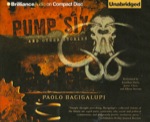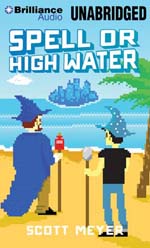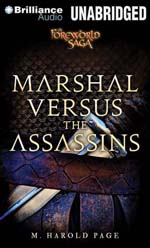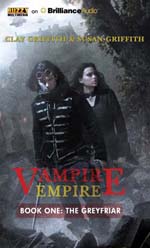
 High Midnight
High Midnight
By Rob Mosca; Narrated by Bernard Setaro Clark
Publisher: ListenUp Audiobooks
Publication Date: June 2014
[UNABRIDGED] – 8 hours, 3 minutes
Themes: / horror / drunk monkeys / psychotic clowns / zombies / Texas /
Publisher summary:
Welcome to Unity, Texas. Population: Bizarre. The only thing protecting the residents of Unity from a stream of nightmares is Laredo Beaumont, the town’s hard-drinking, ass-kicking sheriff, and Cicero, his knife-wielding chimpanzee deputy. It’s a thankless job that leaves Laredo drained and nearly broken. The only solace he can find is in the arms of his beloved Sally Mae, a ghostly soiled dove from a phantom bordello where only the most daring of men would think to step foot.
We’ve all heard that old saying about book cover judgments. Perhaps now it’s time we block out blurb-based reckonings. Rob Mosca’s High Midnight is bursting with criminally psychotic clowns, zombies with a twist, spectral prostitutes, and strange creatures. But it’s also a prime example of good, at times strong writing.
I’m uncertain into which genre High Midnight ought slide. More than likely, it’s a sub-subgenre. Something like Gritty Redneck Bizarro. In the beginning, the weird hyperbolic writing style and content is intriguing. When combined with crisp and skilled writing, you feel anxious and excited. Like a passenger on a hijacked locomotive, you feel your heart speed up to mirror the rushing landscape and you begin wondering where you’re going, and what will happen when you get there. But as the story progresses, we climax, reaching a point at which we can go no faster, further, or weirder, and everything beyond becomes a repetitive flatlining disappointment due to the lack of contrast.
I liked how Mosca would introduce a character, and then immediately leap back in time to show a slivered piece of the character’s history. This allows for a streamlining of exposition without getting bogged down in unnecessary detail. But this approach comes with a price. The story’s momentum becomes the engine, the driving force behind the storytelling. When this occurs, character submits to situation, preventing reader from forging strong bonds with character. Before we know it, and no matter how good the writing, the story is the situation acting upon character, rather than the characters reacting to situation. The result is uninteresting characters. And it’s difficult to create tension when I don’t give a damn if someone lives, dies, laughs, or cries. Situation will always grab our attention, but it is forever characters that maintain it.
High Midnight gets high marks for the audiobook. Bernard Setaro Clark is a name to remember. Clark narrates the audiobook, and captures the story’s voice. Whether it’s a clown’s ghastly giggle, drawling redneck sheriff, or explicit ghostly fornication, Clark delivers a tremendous reading. If you’re going to give this a read, I highly recommend listening to the audiobook.
Posted by Casey Hampton.
 The Naked Sun (Robots #2)
The Naked Sun (Robots #2)
 Spell or High Water (Magic 2.0 #2)
Spell or High Water (Magic 2.0 #2) Marshal versus the Assassins (A Foreworld SideQuest)
Marshal versus the Assassins (A Foreworld SideQuest) The Greyfriar (Vampire Empire #1)
The Greyfriar (Vampire Empire #1)